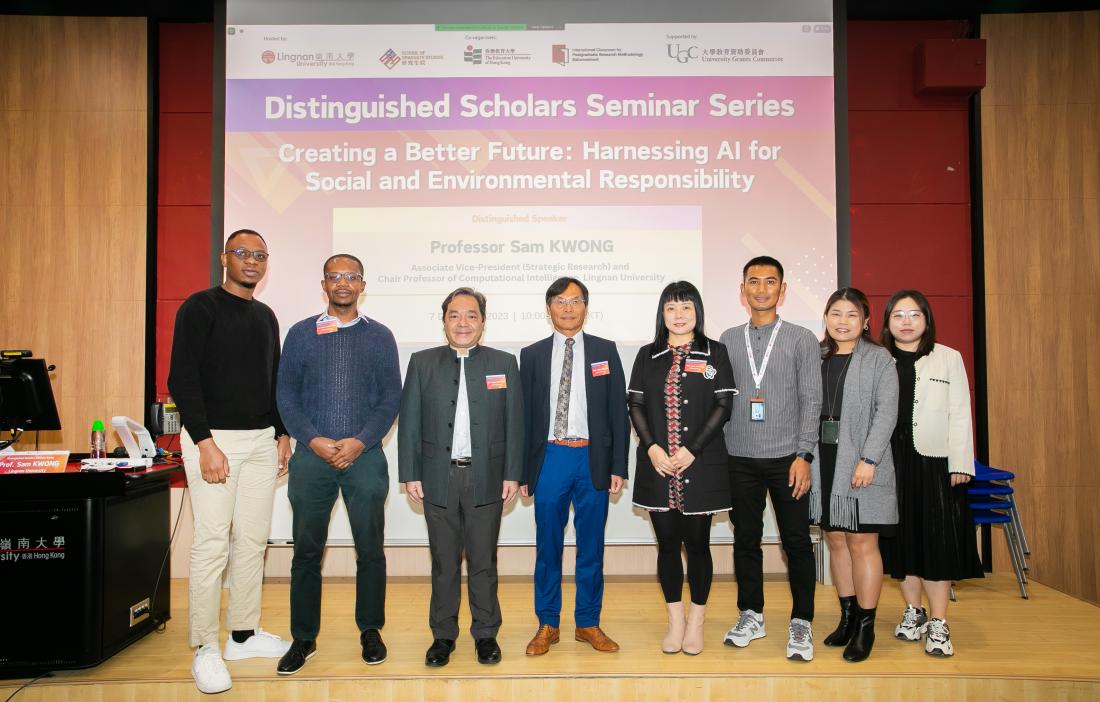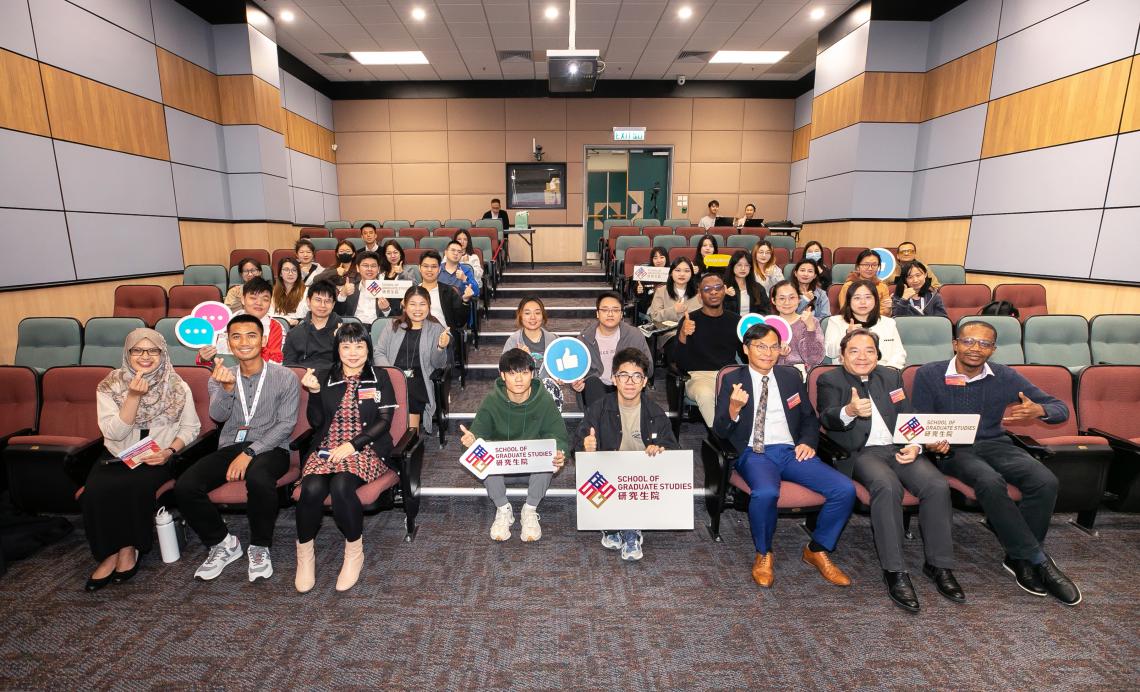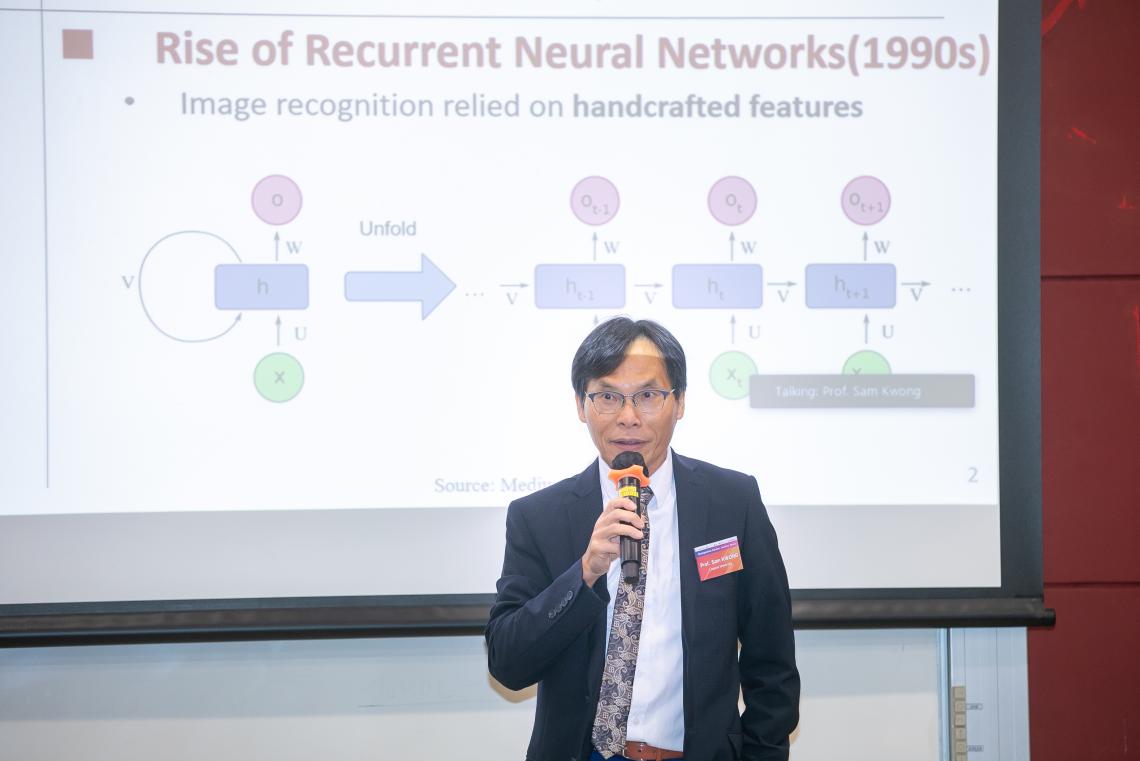Prof Sam Kwong Tak-wu, Chair Professor of Computational Intelligence and Associate Vice-President (Strategic Research) at Lingnan University (4th on the left) takes a photo with Prof Joshua Mok Ka-ho, Vice-President and Dean of the School of Graduate Studies at Lingnan University (third on the left) and faculty members.
Prof Sam Kwong Tak-wu delivers an inspiring lecture on AI’s influence in social, environmental, and educational arenas.
The Distinguished Scholars Seminar Series organised by Lingnan University’s School of Graduate Studies presented its fourth session on 7 December “Creating a better future: harnessing AI for social and environmental responsibility” was delivered by Prof Sam Kwong Tak-wu, Chair Professor of Computational Intelligence and Associate Vice-President (Strategic Research) at Lingnan University. Prof Kwong was recently on the “Highly Cited Researchers 2023” list and in the seminar, he analysed how the rapid rise of artificial intelligence and robots in recent years will affect human work and daily life.
Prof Joshua Mok Ka-ho, Vice-President and Dean of the School of Graduate Studies at Lingnan University thanked Prof Kwong for his significant contribution to the seminar series. The world continues to discuss AI and its impact, and Prof Mok highlighted the importance of understanding artificial intelligence (AI)’s influence in the social, environmental, and educational arenas.
An expert in AI, Prof Kwong lectured on its history and evolution since the 1950s to recent advancements in deep neural networks. One area of advancement is Large Language Models, where four Generative Pre-trained Transformers (GPT) were developed between 2018 and 2023. However, these developments come with heavy computational requirements due to the increasing size of deep learning networks. In light of this, Prof Kwong emphasises the importance of considering environmental and social responsibilities when developing AI technologies. He believes that researchers and societies should focus on how to make better use of technology and AI, rather than just pursuing technological advancements. “By taking a responsible approach to AI development, we can ensure that the benefits of these technologies are maximised while minimising any negative impacts," he pointed out.
The seminar underlined many human AI uses and Prof Kwong shared the latest findings from his recent publications and research projects to demonstrate these. Examples of everyday usage include mobile phones and AI-driven apps. AI also assists artists and designers in creating visuals and art, as well as enhancing security protocols, medical diagnostics, traffic safety algorithms and comprehensive analyses of underwater ecosystems. AI is also important in the social realm, where it allows companies to make decisions and create new products faster. It also opens up new markets with augmented reality and AI-driven content creation. Furthermore, AI improves public safety, and is used in healthcare to improve medical imaging, diagnose diseases, and treat and monitor patients remotely. In environmental responsibility, artificial intelligence helps to monitor marine life, both in terms of biodiversity assessment and endangered species detection, as well as checking water quality in order to detect pollutants and assess ecological health.
Prof Kwong also spoke of his research findings beyond multimedia in other challenging environments, including underwater and low light conditions. He has developed AI underwater algorithms for image and video enhancement which address issues of low visibility and poor lighting conditions. His research has led to improved image and video quality for applications such as underwater surveillance, marine biology and exploration.
Prof Kwong had a lively discussion with the audience, emphasising the importance of examining how technology can contribute to enhancing human life, and concluded with two important questions for further investigation: do we need a machine to generate everything or not? Is data leading to AI, or is AI leading to data?
The Distinguished Scholars Seminar Series is part of Lingnan University’s commitment to promoting academic excellence and fostering intellectual exchange. The seminar series is taking place between November and December 2023, and it introduces world-renowned scholars who share their insights and expertise on diverse topics. Prof S. Joe Qin, President of Lingnan University will conduct the final seminar on the topic of "Challenges and Opportunities for Liberal Arts Universities in the ChatGPT Era – A Case for Lingnan University". To learn more about the Distinguished Scholars Seminar Series, please visit https://www.ln.edu.hk/sgs/news/Distinguished-Scholars-Seminar-Series.





